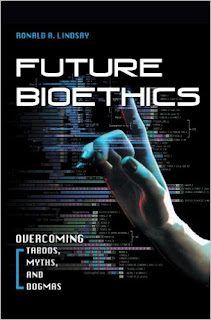by Gary Berg-Cross
The observation of
being penny-wise but pound foolish probably covers lots of example of poor
reasoning, some of it public that misses the big picture because of things like niggling adherence
to narrowly interpreted dogma. We don’t conduct witch trials anymore, although
there is still a non-enforced, minority belief that the devil is abroad and the
anti-Christ may be with us. It is reassuring to observe that we’ve slowly come to the realization that religious beliefs, such as from
the Hebrew Bible, change as our knowledge and understanding of reality advances.
Religious prescriptions, such as women’s rights or the inherent evilness of
people, are not anchored in granite; and thus do not provide an ethical basis
for establishing just & durable laws. Instead a good portion of society has
come to understand that ethics and morality can be and are best

separated from
religion. There is a pragmatic element to laws which are based on experience with
lessons than come to be rationalized and mutually accepted. These are then empirical, rational and institutionally
vetted beliefs that in turn ground ethics and morality. As Ron Lindsay (A
featured speaker at our regional WASHcon15
in Lynchburg, VA., October 2-4, 2015.)
put it in Future Bioethics: OvercomingTaboos, Myths, and Dogmas we want
"a well-reasoned, pragmatic
approach" with substance.
One might talk about
this in terms of pragmatic
ethics , a theory of normative, progressive philosophical ethics going
back to ethical pragmatists, like John Dewey. The idea is that some societies have
progressed morally in a way that is similar to scientific progress. Progress is
based on inquiry into testing ideas. Is
no fault divorce a good idea? Let’s test
it and if it proves useful future generations can refine, build on or replace is
as social principle.
So as we still find enemies
enough and have institutional cruelty in some areas of society there is
preponderance of pragmatic sense and we’ve seen some cultural progress on a
large scale. One example is growing acceptance of gay marriage.
But bucking the trend are some penny-unwise spots of resistance on very
narrow symbolic grounds provided by a blend of religious, emotional and
ideological roots.
In the gay marriage
case it is some free floating belief in the idea of the “sanctity” of
marriage. Exhibit A might be from fundamentalist Kentucky county clerk Kim
Davis (she had served a deputy role in that office for many years) who pitches a penny-narrow definition of a religious, civil right. Indeed the Davis family
has a long history in Rowan County, Kentucky.
She ran her election campaign to replace her mother who was Rowan County
Clerk before her. Among Kim’s arguments for
the office was efficiency - the public needed a seamless transition from mom
Davis and Kim could provide uninterrupted services including for things like
marriage licenses. This sounds ironic now, but daughter Davis was (narrowly) elected in
2014 to be County Clerk.
Now in office, rather
than keeping her “civil (religious freedom) rights” to herself, she seems to feel privileged as a
public official to pick and choose from ancient prescriptions as her guide to public behavior. This seems surprising since she was
elected to a public, secular office she know well and there are laws governing behavior. We expect that public officials will understand that to operate
efficiently we have a pragmatic, modifiable Constitution that is not based on
faith this side of the Enlightenment. Our
founders themselves realized that basing laws and governmental practices on
religious beliefs would be ultimately unworkable at the public level. But Kim’s
penny foolishness, like others, anchors itself in frozen, fundamentalist
ethical judgement on things like marriage. And as Ron Lindsey points out they can defensively externalize their own real dogmatism to attribute righteousness on others:
"Any attempt by humans to control and shape their
lives in ways not previously contemplated by some religious tradition results
in the claim that we are trying to 'play God.'"
Projection may not be the only psychological process going on here. Pragmatic agreements
take time, effort and compromise. They require "thinking slow" and critically and taking many things into account. It is not at all playing God to do the hard work and getting agreement. So one suspects that
selective “articles of faith” provide an unreasoned rationalization for "believer's" distaste for things just can’t relate to and don’t like. It’s part of the take
back America and “making America great again” slogan we hear as part of the
cultural wars.
Unfortunately articles of
faith, such as the earlier belief in witches, provide ready-made, emotion-laden
explanations rather than reasoned one for when “bad” things happen in the new
America. Recently we had Bill
O’Reilly explain away the phenomena of mass shootings. It’s not guns or
mental illness he argued but atheism. This taps into a cauldron of witchy
beliefs common among fundamentalists and perhaps Kim— that morality derives
from religion. It follows that: "Bible good", "atheists bad", since they lack any real basis
for ethics or morality and live empty lives in pursuit of pleasure in this
world.
Not all religious folk
are like that and at least think through what is ethical for them and could
step aside if religious values kept them from doing their jobs. United Church of Christ's Rev. Emily C. Heath described
how she handled the dilemma of private belief vs public service. She decided
not to apply for a job with the Federal Bureau of Prisons because she of the
death penalty, which went against her religious beliefs. As she observed:
"Religious liberty
is guaranteed in this country. But that does not mean that every job needs to
bend to your particular interpretation of your faith....If you really believe
doing your job is violating your faith, then stepping aside would be a small
price to pay for the love of the Gospel."
But, unfortunately a
rational stepping-aside approach is not what we see as faith intrudes into our
civil processes.
You could hear more pragmatic takes from the WASHcon15
speakers:
·
Ron Lindsay, Center for
Inquiry President and CEO ,
·
Julien
Musolino, author and scholar
·
Tom
Flynn, Executive Director Council for Secular Humanism
·
Dr. Andy
Thomson, author and psychiatrist
·
Dr. Jason D. Heap,
United Coalition of Reason Executive Director , and
·
Linda
LaScola, author and researcher .




















